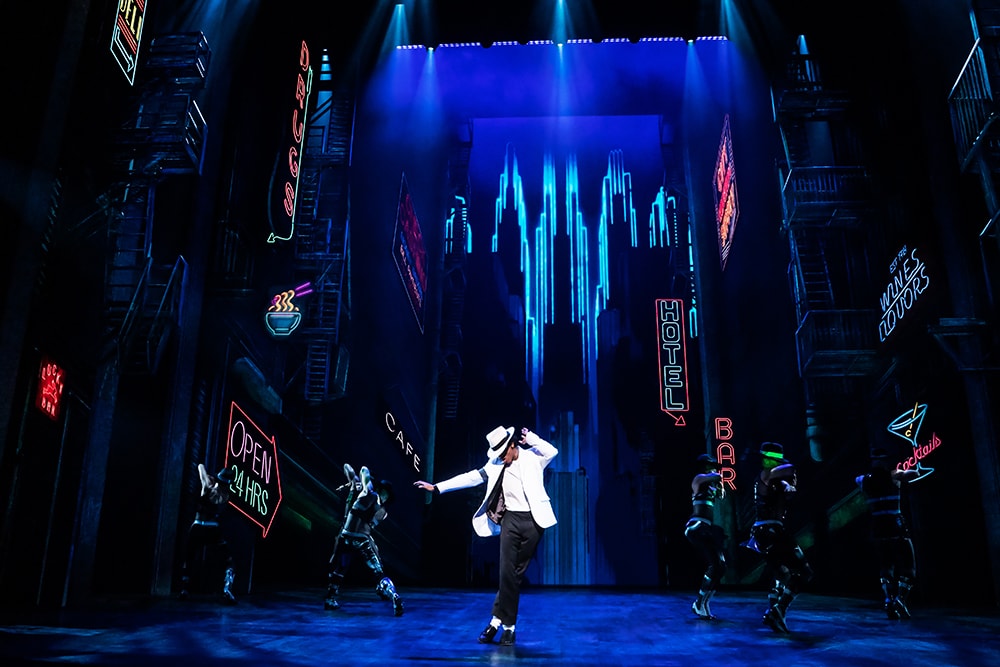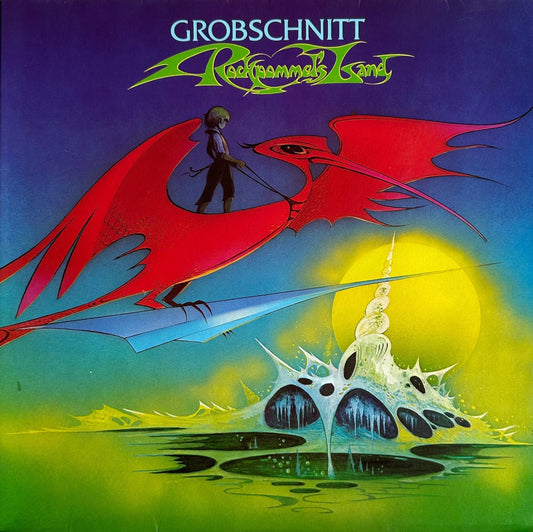As Seen Through a Woke Prism As
Copper is and should always be about the music, I want to say this up front. Looking at his career purely as a musical artist, I have always been a huge Michael Jackson fan. His development as an artist and the music he created are among the greatest pop music achievements ever. Add to that the fact that his groundbreaking videos (especially 1983’s “Thriller”) blew MTV wide open a year before my band’s video, “We’re Not Gonna Take It” aired, which, without a doubt, made it easier for my record label to accept Twisted Sister’s much longer, narrative version (the one with the screaming father), to push onto MTV, rather than the shorter edit originally intended for video promotion.

Photo courtesy of Emilio Madrid.
Which brings me to this review. Last week my wife and I went to see the new Michael Jackson “jukebox musical,”
MJ: The Musical, on the recommendation of a close friend and Broadway veteran musical performer who cautioned us, “the show is amazing but the book had a lot of flaws.” That description tells you all you need to know. On a purely visceral, musical and theatrical level, the show and its main star Myles Frost, as the older Michael Jackson, are astonishing. (Two other actors portray Jackson: Christian Wilson as the younger Jackson, and Tavon Olds-Sample playing Jackson from his teen years through his early 20s.) The history of the musical journey of “MJ” as the greatest solo artist in pop music history, from the Jackson 5 in 1969 up to the 1992
Dangerous tour, is blissfully performed, with incredible staging to go along with the flow of the show. This is where, however, it gets a little tricky. The first time I heard that a musical based on the life of Michael Jackson was coming to Broadway, I thought to myself: what’s next?
Gimme Shelter: the Harvey Weinstein musical?
Love Me Tender: the new Jeffrey Epstein musical? Oh…the list could go on and on. Such are the thoughts that went through my head, and how could they not. The media saturation regarding the sexual misconduct accusations against Michael Jackson was pervasive – but he was never
convicted of any crime and this is where the musical, in my opinion, is allowed to create a narrative with an off-ramp. As we live in a cancel culture and “woke” world in which
The Cosby Show has, among others, almost totally disappeared from TV and Gary Glitter’s music has vanished into thin air, it came as no surprise to me when I started reading stories in music industry journals about whether Michael Jackson’s music was also going to disappear from the airwaves, both terrestrial (AM/FM stations) and online/satellite (Sirius XM). The programmers interviewed and quoted really didn’t want to take the music off because of the allegations of sexual misconduct against Jackson, unless the public demanded it. That uproar never came. Thus the Jackson 5 and all the iterations of MJ’s career are broadcast daily in a frequency that doesn’t appear to have diminished. httpv://www.youtube.com/watch?v=F9e3U2Fxnbg With that public indifference comes the big gamble. With a song catalog that is as varied and timeless as Jackson’s, can a Broadway “book” be written that allows a story to be told without touching on (sorry about that) the child sex scandal allegations and, lest one forget, the exact nature and controversy surrounding his death in 2009? How you want to rationalize these (not-insignificant) issues in terms of paying the high ticket price of a Broadway show, as well as your ability to enjoy the musical is dependent upon how much you can separate yourself from all the bad press. Here is some insight into MJ’s career that was not mentioned in the show but may interest some of you: my band Twisted Sister recorded part of our 7-million worldwide-selling album
Stay Hungry at Westlake Recording Studios in Los Angeles, where Quincy Jones had recorded Jackson’s
Thriller two years before. Some of the engineers on our record had worked on
Thriller there as well. They told us some stories. According to these studio people, Michael’s record label, Epic, was on the verge of bankruptcy in 1982 and that Jones was warned that
Thriller (which they said was $750,000 over budget and nine months late) was in danger of not coming out if Q (Quincy) didn’t deliver the album in 48 hours after the notice given him. Q did mix it in 48 hours to make Columbia/Epic happy, along with a note saying that he needed two more weeks to really get it right. After
Thriller was finally delivered, the collective brain trust at Columbia/Epic reported back that the only song that was a marketable single was “Billie Jean,” and that it would not be sufficient to stave off bankruptcy because the album wouldn't sell past 3 million copies! Of course, no one could have imagined that Michael Jackson would premiere his “Moonwalk” on national TV during the Motown 25
th anniversary special in May 1983 which, like the Beatles on
The Ed Sullivan Show, altered the popular music landscape and catapulted
Thriller to sales of more than 100 million copies worldwide (estimates vary and I might have more to say on this in a later article), making it the most successful album in history. As far as
MJ: The Musical is concerned, the framework and timeline in which it takes place is critical to maintaining a fun, positive and ultimately uplifting message. I had no idea how the scandals and MJ’s death would (or would not) be dealt with. The show opens with a scene in a rehearsal room for the band and dancers. It shows how Michael is obsessed with every single detail of the upcoming 1992 Dangerous World Tour.
I thought to myself, watching this intro and knowing what I know about the creation of a “performance arc” for the purpose of constructing the narrative, well…how convenient. 1992 was before the sexual allegations. Sure, there had been all of the plastic surgery, the skin whitening, the chimp. the friendships with Brooke Shields and Macaulay Culkin, the purchase of the Elephant Man’s skeleton, and the rumors of him sleeping in an oxygen chamber, but that was all the cheap Wacko Jacko National Enquirer kind of stuff we all knew about. What if the narrative begins and ends there, in 1992? That would save having to deal with all the rough stuff, all the sexual allegations and his death. The show is masterfully staged and, for the most part, so are the musical excerpts – there are so many hits that some are limited to bits that are just a minute or two long. And the hits just keep on coming, as does the nostalgia of the Jackson 5’s debut at the Apollo Theater in Harlem, The Ed Sullivan Show, the Soul Train debut and on and on. It is amazing that the music just washes over you year by year, decade by decade, with the show connecting all the dots that you would expect.
Yes, there is a drama-filled Berry Gordy/Suzanne de Passe moment. (Suzanne de Passe was the one who brought the Jackson 5 to Motown and was later made president of Motown Productions.) There’s the Jackson 5 breaking up (and getting back together later on) with Michael going solo and, of course, Michael’s titanic collaborations with Quincy Jones. But weirdly, there’s no mention of the legendary Motown 25: Yesterday, Today, Forever 1983 TV special. While the breakthrough TV show was alluded to (the “moonwalk” sequence with the white glove was recreated) it was never specifically mentioned, for reasons that puzzled me. They had already portrayed Motown founder Berry Gordy. That performance was as important to the solo Michael Jackson rise as the Beatles’ The Ed Sullivan Show performance by the Beatles. Michael’s father, Joe Jackson, was portrayed in a very negative light in his treatment of young Michael, so as to (in my opinion) create a Bogeyman and explain away any of Michael’s insecurities and peculiarities (and I do mean all of them…). On the other hand, Jackson’s mother Katherine Jackson was portrayed as almost saintlike. As a producer, I get that, given so much material, a lot has to be left on the cutting room floor. But I question some of those decisions. And to be fair, for example, in Bohemian Rhapsody, the worldwide smash movie about Queen and Freddie Mercury, the producers, who were the band themselves, didn't get the timelines correct on when some of the songs were done. How did that happen??? Since this show was approved by the Michael Jackson estate, you can only imagine how they must have given very strict ground rules to the creators.

Myles Frost. Photo courtesy of Emilio Madrid.
All the actors and the dances are first-rate, up there with some of the best choreography I have ever seen staged on Broadway. The audience was racially mixed, which also made me feel good. The performance by Myles Frost is absolutely mesmerizing, like you were watching Michael talk, sing and dance in front of your eyes. I have no idea where they will ever find another singular performer that so embodies his character as does Myles. The audience, especially in the end, went crazy. That tells you all you really need to know. If you can put aside all the issues I have brought up, then you will have one hell of a time. We did and we had questioned whether we could. That question was answered unequivocally.

Photo courtesy of Emilio Madrid.
Header image: Myles Frost as Michael Jackson. Photo courtesy of Matthew Murphy.
 Photo courtesy of Emilio Madrid.
Photo courtesy of Emilio Madrid. Michael Jackson during the Dangerous World Tour. Courtesy of Wikimedia Commons/Constru-centro.
Michael Jackson during the Dangerous World Tour. Courtesy of Wikimedia Commons/Constru-centro.
 Myles Frost. Photo courtesy of Emilio Madrid.
Myles Frost. Photo courtesy of Emilio Madrid. Photo courtesy of Emilio Madrid.
Photo courtesy of Emilio Madrid.


